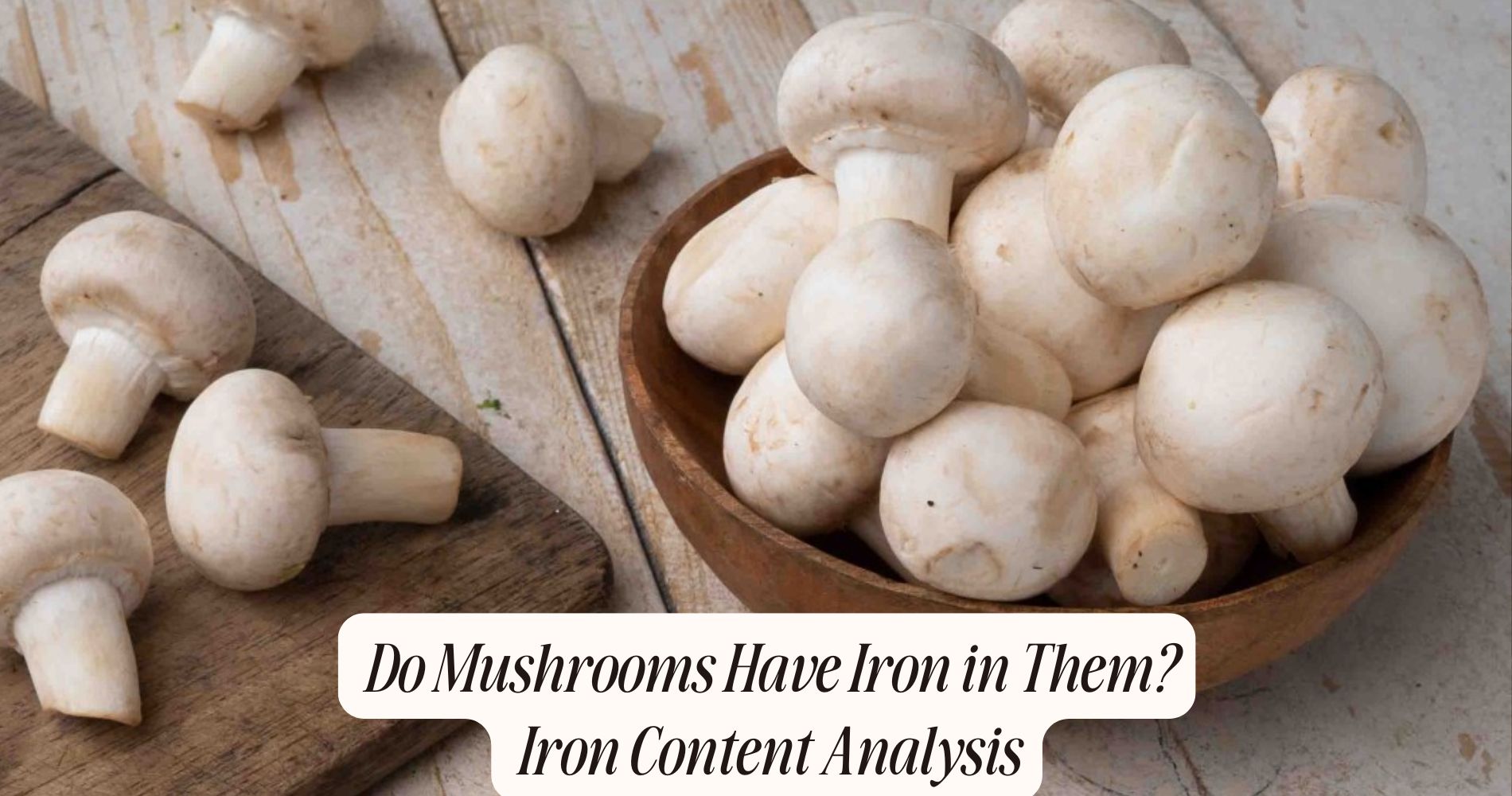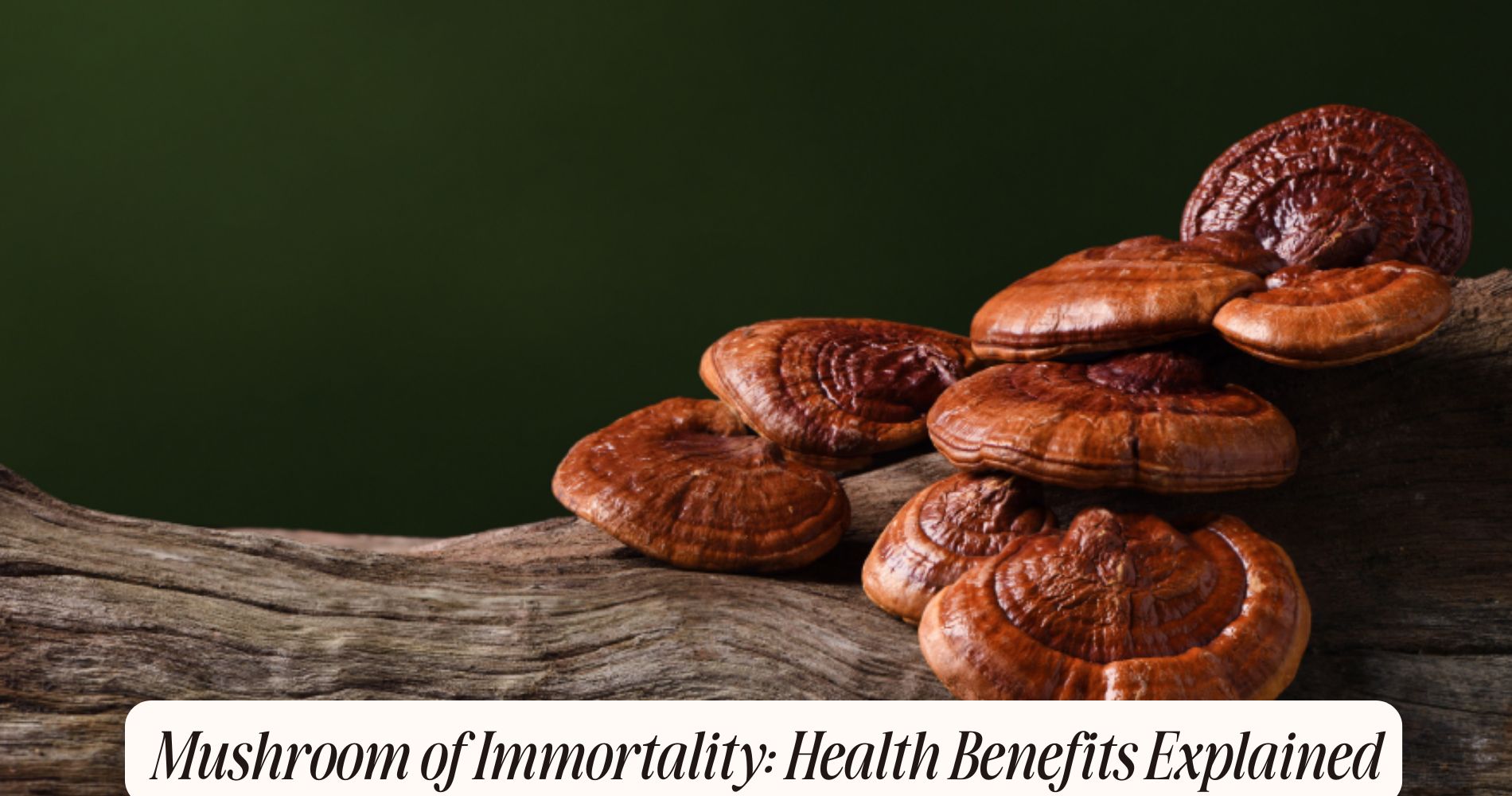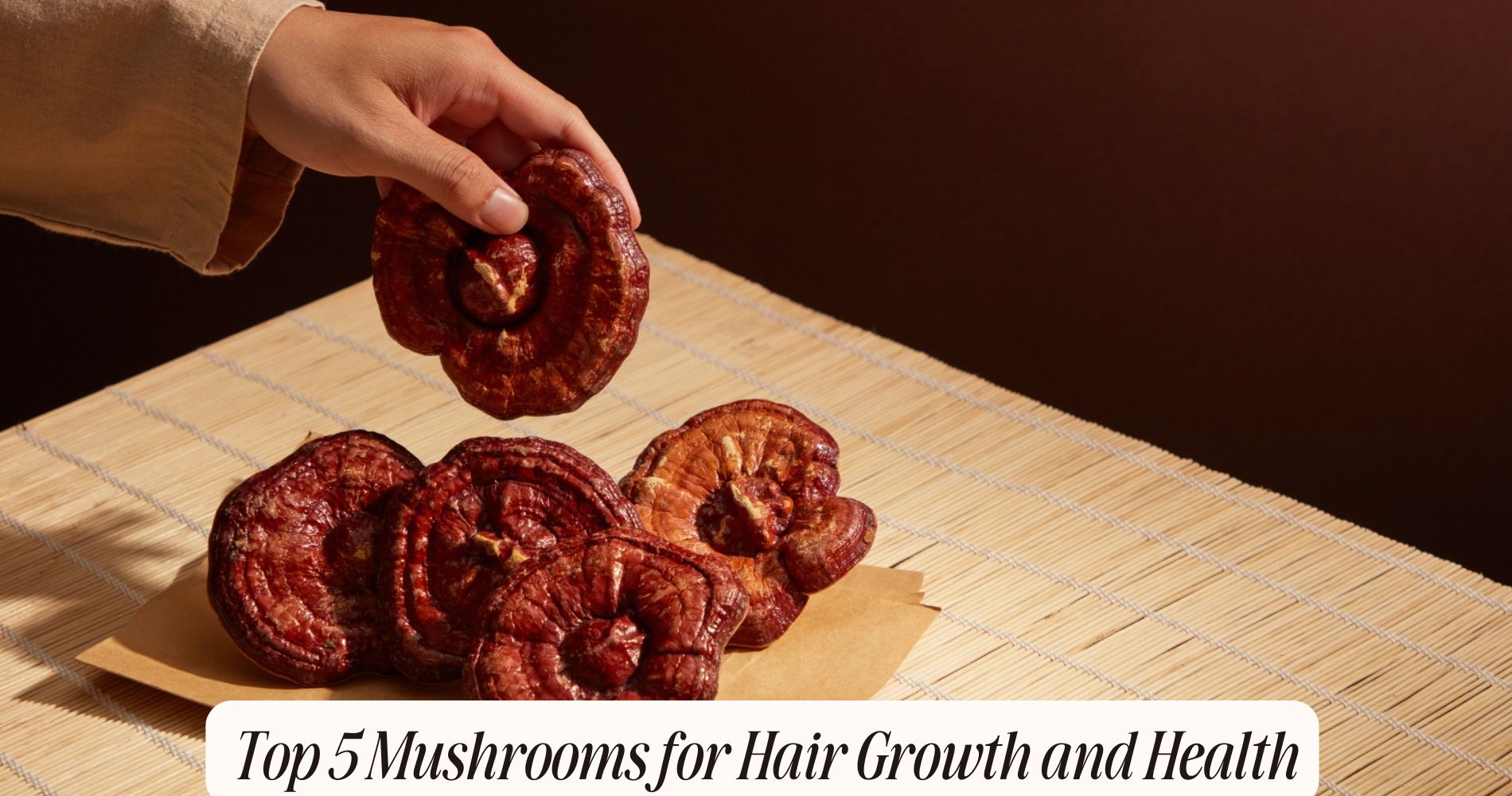
Do Mushrooms Have Iron in Them? Iron Content Analysis
Do mushrooms have iron in them? Yes, mushrooms do have iron, which is essential for oxygen transport and overall health. Different types of mushrooms offer varying iron levels: white button mushrooms contain about 0.3 mg per 100 grams, while shiitake mushrooms provide approximately 1.7 mg per cooked cup. Cremini mushrooms are particularly rich, with around 2.1 mg of iron per 100 grams. Pair mushrooms with vitamin C-rich foods to enhance iron absorption. Cooking methods like grilling or sautéing can help retain their iron content. Incorporating mushrooms into your diet supports your iron levels and offers other health benefits. Discover more about these fascinating fungi and their nutritional impact.
Iron's Role in the Body
Iron is essential for your body's ability to transport oxygen and maintain healthy cells, skin, hair, and nails. Hemoglobin, a protein in red blood cells, relies on iron to carry oxygen from your lungs to the rest of your body. Without enough iron, your tissues and organs can't get the oxygen they need, leading to iron deficiency.
Iron deficiency is a common nutritional issue that can cause symptoms like fatigue, weakness, and poor concentration. In severe cases, it can lead to anemia, a condition characterized by a lack of healthy red blood cells. If you're experiencing these symptoms, it's vital to consult a healthcare provider. They might recommend iron supplements to boost your iron levels.
Iron supplements come in various forms, such as ferrous sulfate, ferrous gluconate, and ferrous fumarate. These can effectively restore your iron levels, but it's important to take them under medical supervision to avoid side effects like constipation or stomach upset.
Additionally, consuming iron-rich foods like lean meats, beans, and fortified cereals can help maintain sufficient iron levels. Keeping track of your iron intake guarantees your body functions at its best and helps prevent deficiencies.
Nutritional Profile of Mushrooms
When considering the nutritional profile of mushrooms, you'll find they're low in calories yet packed with essential nutrients like vitamins, minerals, and antioxidants. Mushrooms are a great source of B vitamins, including riboflavin, niacin, and pantothenic acid, which help support energy production and maintain healthy skin and nerves. They also provide important minerals such as selenium, copper, and potassium.
Mushroom varieties like button, shiitake, and portobello each offer unique nutrient profiles. For example, shiitake mushrooms are known for their high levels of polysaccharides, which may boost your immune system. Portobello mushrooms contain ergosterol, a compound that converts to vitamin D when exposed to sunlight. This makes them an excellent choice for those with limited sun exposure.

For those with specific dietary preferences, mushrooms are an outstanding option. They're naturally fat-free, cholesterol-free, and low in sodium, making them suitable for heart-healthy diets. Additionally, mushrooms are rich in antioxidants like ergothioneine and glutathione, which combat oxidative stress and may reduce the risk of chronic diseases.
Incorporating various mushroom varieties into your diet not only diversifies your meals but also enhances your nutrient intake, supporting overall health and wellness.
Types of Mushrooms Analyzed
Among the many mushroom varieties analyzed, button, shiitake, and portobello stand out for their distinctive nutrient profiles and health benefits. These mushrooms aren't only popular in various cuisines but also rich in essential nutrients, including iron, which plays an essential role in maintaining your health.
Button mushrooms, the most commonly consumed type, provide a modest amount of iron. They're often touted for their ability to support iron absorption due to their vitamin C content, which enhances the bioavailability of iron.

Shiitake mushrooms, known for their robust flavor and medicinal properties, contain higher iron levels compared to button mushrooms. They also offer a unique array of polysaccharides and antioxidants that can improve overall health.
Portobello mushrooms, the mature form of the button variety, offer a significant iron boost in your diet. They're also rich in dietary fiber and other essential vitamins and minerals, making them a powerhouse for overall nutrition.
Including these mushroom varieties in your meals can be an excellent way to increase iron intake and improve iron absorption, contributing to better energy levels and overall well-being.
White Button Mushrooms
When you look at white button mushrooms, you'll find they contain about 0.3 mg of iron per 100 grams, which can contribute to your daily intake.
Cooking methods like sautéing or grilling can affect their iron levels, so it's important to choose wisely.
Including these mushrooms in your diet can help boost your iron intake, supporting overall health and preventing iron-deficiency anemia.
Nutritional Iron Levels
White button mushrooms pack a surprising punch of nutritional iron, making them a valuable addition to your diet. Among various mushroom varieties, white button mushrooms stand out due to their iron content, which is vital for combating iron deficiency. One cup of raw white button mushrooms contains approximately 0.3 milligrams of iron. While this amount may seem modest, it contributes considerably when combined with other iron-rich foods.
Iron is an essential mineral that plays a critical role in oxygen transport and energy production in your body. Insufficient iron can lead to iron deficiency anemia, characterized by fatigue, weakness, and compromised immune function. Including white button mushrooms in your meals can help you meet your daily iron requirements, particularly if you're following a vegetarian or vegan diet, which can sometimes lack adequate iron sources.
Moreover, white button mushrooms are low in calories and high in other essential nutrients like vitamin D, potassium, and antioxidants. This nutrient profile makes them not only a versatile ingredient but also a powerhouse for overall health.

Health Benefits Overview
Packed with essential nutrients, white button mushrooms offer numerous health benefits, including boosting your immune system and providing a rich source of antioxidants. These mushrooms are low in calories but high in key vitamins and minerals such as vitamin D, selenium, and potassium. The antioxidants in white button mushrooms, particularly ergothioneine and glutathione, help combat oxidative stress, reducing the risk of chronic diseases.
Including white button mushrooms in your diet can improve your immune response. They contain beta-glucans, which are known to enhance the activity of immune cells, thereby helping your body fend off infections. Additionally, these mushrooms are a good source of B vitamins, such as riboflavin, niacin, and pantothenic acid, which play vital roles in energy metabolism and maintaining brain health.
When comparing mushroom varieties, white button mushrooms stand out for their versatility and health benefits. They can easily be incorporated into various dishes, making it simple to reap their nutritional advantages. Their iron content, although modest, contributes to your daily intake, supporting red blood cell production and oxygen transport.
Cremini Mushrooms
Cremini mushrooms are a nutrient-dense variety that offer a substantial source of dietary iron, making them a valuable addition to a health-conscious diet. When you look into cremini cultivation, you'll find that these mushrooms thrive in nutrient-rich compost, which contributes to their impressive nutritional profile. They're often grown in controlled environments to guarantee peak quality and iron content.
In terms of their iron content, cremini mushrooms contain about 2.1 milligrams of iron per 100 grams. This makes them an excellent plant-based alternative for boosting your iron intake. Including cremini mushrooms in your diet can help support red blood cell production and prevent iron-deficiency anemia.
Now, let's talk about cremini recipes. These mushrooms are incredibly versatile and can be incorporated into a variety of dishes. You can sauté them with garlic and olive oil for a simple side dish, or add them to soups and stews for extra depth and nutrition. They also pair well with leafy greens in salads, enhancing not just the flavor but also the nutritional value of your meals.
Portobello Mushrooms
Portobello mushrooms are a fantastic source of iron, providing about 0.5 mg per cup.
Incorporating them into your diet can support your body's hemoglobin production and overall oxygen transport.
Additionally, they offer other health benefits, such as being rich in antioxidants and fiber.
Nutritional Iron Levels
When considering the nutritional profile of Portobello mushrooms, you'll find they provide a modest but beneficial amount of iron, which is essential for maintaining healthy blood and energy levels. Among the various mushroom varieties, Portobellos stand out for their unique texture and flavor, but they also contribute to your daily iron intake. Each cup of sliced, grilled Portobello mushrooms contains approximately 0.3 mg of iron. While this might seem small compared to other iron-rich foods, it's a valuable addition to a balanced diet, especially if you're concerned about iron deficiency.
Iron is vital for producing hemoglobin, the protein in red blood cells that carries oxygen throughout your body. Without enough iron, you risk developing anemia, a condition marked by fatigue and weakness. Including Portobello mushrooms in your meals can help mitigate this risk. They pair well with other iron-rich foods, such as spinach and legumes, enhancing your overall nutrient intake.

Furthermore, the iron in Portobello mushrooms is non-heme, which is the type found in plant-based foods. To maximize absorption, consider consuming them with vitamin C-rich foods like bell peppers or citrus fruits. This combination can greatly boost your body's ability to utilize the iron from these nutritious mushrooms.
Health Benefits Overview
Incorporating Portobello mushrooms into your diet offers numerous health benefits, including enhanced immune function and improved digestive health. Rich in essential nutrients, Portobello mushrooms contain vitamins B and D, which support your immune system. Vitamin D, in particular, helps regulate calcium and phosphorus absorption, bolstering bone health.
Portobello mushrooms are also a good source of dietary fiber, aiding in digestion and maintaining gut health. The fiber content can help prevent constipation and promote regular bowel movements. Additionally, these mushrooms provide antioxidants like selenium and ergothioneine, which combat oxidative stress and may reduce inflammation.
Among mushroom varieties, Portobello mushrooms stand out for their substantial protein content, making them a significant addition to vegetarian and vegan diets. They also provide key minerals such as potassium, which helps regulate blood pressure, and iron, which is essential for oxygen transport in the blood.
Including Portobello mushrooms in your meals can contribute to weight management as well. They're low in calories but high in water content, helping you feel full longer. By integrating this nutrient-dense food into your diet, you can enjoy a range of health benefits while also diversifying your intake of mushroom varieties.
Shiitake Mushrooms
Shiitake mushrooms are a rich source of iron, making them an excellent addition to a nutrient-dense diet. These mushrooms come in various shiitake varieties, each offering slightly different flavors and textures, but all providing substantial health benefits. When you incorporate shiitake mushrooms into your meals, you're not just enhancing the taste but also boosting your iron intake.
One cup of cooked shiitake mushrooms contains approximately 1.7 milligrams of iron, which contributes to about 9% of the daily recommended intake for an average adult. Iron is essential for producing hemoglobin, which helps transport oxygen throughout your body, preventing anemia and fatigue.

You can enjoy shiitake mushrooms in numerous culinary uses. They're versatile and can be sautéed, grilled, or used in soups and stews.
Shiitake mushrooms also pair wonderfully with a variety of dishes, from stir-fries to pasta. Their meaty texture and umami flavor make them a popular choice for enhancing both vegetarian and meat-based recipes.
Oyster Mushrooms
Oyster mushrooms, another excellent source of iron, offer a unique nutritional profile that complements the benefits of shiitake mushrooms. Rich in iron, oyster mushrooms can help meet your daily nutritional needs. They provide approximately 1.3 mg of iron per 100 grams, making them a valuable addition to your diet.
In terms of culinary uses, oyster mushrooms are incredibly versatile. Their delicate texture and mild, slightly peppery flavor profile make them a perfect ingredient for various dishes, from stir-fries to soups. You can sauté, grill, or even roast them to enhance their natural flavors.

Beyond their culinary appeal, oyster mushrooms are known for their medicinal properties. They contain compounds like beta-glucans, which have been shown to boost the immune system and exhibit anti-inflammatory effects. This makes them not just a tasty addition to your meals but also a beneficial one for your health.
Oyster mushrooms also offer significant environmental benefits. They can grow on a variety of substrates, including agricultural waste, helping to recycle organic materials. This sustainable cultivation practice makes them an eco-friendly choice, contributing positively to both your health and the environment.
Enhancing Iron Absorption
To boost iron absorption from mushrooms, pair them with foods rich in vitamin C, such as bell peppers or citrus fruits. This is one of the most effective iron absorption techniques.
Vitamin C enhances the bioavailability of non-heme iron, the type found in mushrooms, by converting it into a form that's easier for your body to absorb. Consider adding a squeeze of lemon juice to your mushroom dishes or having a side of strawberries.
Dietary pairing strategies can greatly impact your iron uptake. For instance, consuming mushrooms with foods high in vitamin A, like carrots or sweet potatoes, can also enhance iron absorption.
Research shows that vitamin A and beta-carotene may increase the bioavailability of iron, helping you meet your nutritional needs more effectively.
Moreover, it's essential to avoid certain inhibitors that can hinder iron absorption. For example, tannins in tea and coffee, calcium in dairy products, and phytates in whole grains and legumes can reduce the amount of iron your body absorbs.
Boost Your Iron Intake with SUPER MUSHROOM GUMMIES
While exploring the iron content in mushrooms, consider enhancing your diet with Well Gummies' SUPER MUSHROOM GUMMIES. This convenient gum chew product is packed with 10 types of functional mushrooms. Our vegan gummies naturally fuel your brain and energize your body, providing calmer energy, sharper focus, and immune support for a balanced body and clear mind.
Enjoy the delightful taste of fresh wild berries, just as delicious as your favorite candy, but without the jitters or crash. Shine all day with the natural benefits of SUPER MUSHROOM GUMMIES and support your health effortlessly.
Frequently Asked Questions
Can Cooking Methods Affect the Iron Content in Mushrooms?
Yes, cooking techniques can affect the iron content in mushrooms. Certain methods, like boiling, may reduce nutrient retention, while others, such as steaming or sautéing, help preserve more iron and other essential nutrients.
Are There Any Mushroom Species With Exceptionally High Iron Content?
You should know some mushroom varieties, like shiitake and morel, offer exceptional nutritional benefits with higher iron content. Including these in your diet can boost your iron intake and contribute to overall health.
How Does the Iron Content in Mushrooms Compare to Meat Sources?
When comparing iron content, mushroom varieties generally have less iron than meat sources. However, for those with specific dietary preferences, mushrooms can still contribute to your iron intake, providing a valuable nutrient boost.
Do Dried Mushrooms Have More Iron Than Fresh Mushrooms?
Yes, dried mushrooms have more iron than fresh mushrooms. The drying process concentrates the nutrients, including iron, making dried mushrooms a richer source. Incorporating them into your diet can boost your iron intake effectively.
Is the Iron in Mushrooms Easily Absorbed by the Body?
You're wondering about iron bioavailability in mushrooms. While mushrooms contain iron, their absorption factors are less favorable compared to animal sources. Consuming them with vitamin C-rich foods can enhance iron absorption and boost nutrient intake.
Conclusion
You've learned that mushrooms, including white button, cremini, shiitake, and oyster varieties, do contain iron, albeit in modest amounts.
While they aren't the richest sources, incorporating them into your diet can still contribute to your iron intake.
Pairing mushrooms with vitamin C-rich foods can boost iron absorption.
So, don't overlook these nutrient-dense fungi—they're a valuable addition to a balanced, iron-conscious diet.




